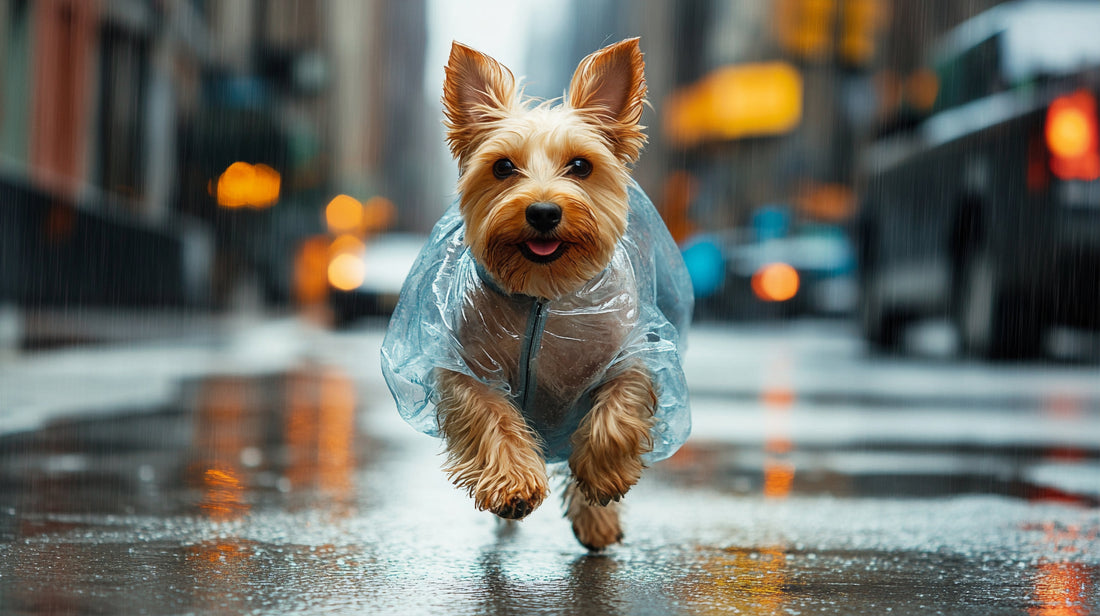If you're a dog parent wondering how to keep your furry friend healthy during the rainy season, you're not alone. The monsoon brings unique challenges that can catch even experienced pet owners off guard. But don't worry – with the right approach, you can help your dog not just survive but thrive during these humid months.
Why Dogs Need Special Care During Monsoons
During monsoon seasons with different dogs: the combination of high humidity, constant moisture, and temperature fluctuations creates a perfect storm for health issues. Think of it like this – imagine wearing damp clothes all day in a stuffy room. That's essentially what our dogs experience during monsoons.
The moisture doesn't just make them uncomfortable; it becomes a breeding ground for bacteria, fungi, and parasites. I've seen too many dogs develop skin infections, digestive problems, and even behavioral issues during this time. But the good news? Most of these problems are completely preventable.
Essential Monsoon Health Care Tips for Dogs
1. Maintain Proper Grooming During Rainy Weather
Keep Your Dog's Coat Dry and Clean: You can follow the below routine to keep your dog coat dry:
- Dry your dog thoroughly after walks, even if they seem only slightly damp
- Use absorbent towels to remove moisture from their coat
- Pay special attention to areas where water tends to accumulate, like ears, paws, and underarms
- Consider using a blow dryer on cool setting for thick-coated breeds
Regular Brushing is Crucial: Daily brushing prevents matting and improves air circulation in dog's coat. For this you can follow below tips:
- Brush your dog's coat daily to prevent matting and improve air circulation
- Remove loose fur that can trap moisture and cause skin problems
- Use appropriate brushes for your dog's coat type
2. Prevent Skin Infections and Fungal Problems
Watch for Warning Signs: Always prevention is better than cure, you should be aware of below signs that can lead to skin issues in your dog:
- Red, itchy patches on the skin
- Excessive scratching or licking
- Unusual odor from the coat
- Hair loss or bald spots
Preventive Measures
- Keep your dog's sleeping area dry and well-ventilated.
- Wash bedding frequently with antifungal detergents.
- Use medicated shampoos recommended by your veterinarian.
- Avoid letting your dog stay in wet clothes or accessories.
- Adding dog skin and coat supplements in diet can make a huge difference during monsoon season to cure dry and flaky skin.
3. Paw Care of Dog During Monsoon Season
Daily Paw Maintenance: Your pets' paws endure during rainy season. Here's is foolproof routine:
- Clean and dry paws after every walk
- Check for cuts, cracks, or foreign objects between toes
- Trim nails regularly to prevent injuries
- Apply paw balm to protect against moisture damage
Create a Paw Cleaning Station
- Keep towels and paw cleaning solutions near your entrance
- Use pet-safe antiseptic wipes for quick cleaning
- Consider paw boots for walks in heavily contaminated areas
4. Indoor Exercise and Mental Stimulation
Rainy days used to mean restless, destructive dogs until we got creative with indoor activities. Here's what works:
Rainy Day Activity Ideas:
- Interactive puzzle toys and treat-dispensing games
- Indoor agility courses using household items
- Training sessions to teach new tricks
- Hide-and-seek games throughout the house
Maintaining Physical Health Indoors
- Encourage movement with stairs exercises
- Use treadmills designed for dogs (under supervision)
- Practice obedience training that involves physical movement
- Set up indoor play dates with other vaccinated dogs
Anxiety Management for Dogs
Some dogs get anxious during storms. This is where dog calming supplements have been a lifesaver. Natural ingredients like chamomile, L-theanine, and valerian root can help reduce storm anxiety without making dogs drowsy.
5. Nutrition and Hydration Management
Dogs often eat less during humid weather. Instead of forcing larger meals, you can switch to smaller, more frequent feeding. It's easier on their digestive system and prevents food spoilage.
Adjust Diet for Humid Weather
- Provide easily digestible foods during high humidity
- Reduce portion sizes if your dog is less active
- Add dog gut health supplements with dog's probiotics and digestive enzymes to my dogs' diets during rainy months.
- Avoid leaving food out for extended periods to prevent spoilage
Monitor Water Intake
- Ensure constant access to fresh, clean water
- Change water bowls frequently to prevent bacterial growth
- Watch for signs of dehydration despite the humid weather
- Consider adding electrolytes for dogs if recommended by your vet
Common Monsoon Health Problems in Dogs
Skin Problems in Dogs
Hot spots are the worst. I've found that catching them early is everything. The moment you see excessive licking or a small red patch, you can clean it with saline solution and apply a protective balm. If it doesn't improve within 24 hours, it's vet time.
Digestive Issues in Dogs
Diarrhea during monsoons is unfortunately common. You can keep a bland diet ready (boiled rice and chicken), and probiotics have been my secret weapon for quick recovery.
Respiratory Issues
High humidity can trigger breathing problems, especially in flat-faced breeds. You can run a dehumidifier in the main living area and ensure good air circulation.
Creating a Monsoon-Ready Home Environment
Indoor Air Quality
- Use dehumidifiers to control moisture levels
- Ensure proper ventilation in your dog's sleeping area
- Clean air filters regularly
- Consider air purifiers to reduce allergens
Safe Spaces
- Designate dry, comfortable areas for your dog
- Use waterproof covers on furniture
- Keep emergency supplies easily accessible
- Maintain consistent temperature when possible
When to Consult Your Veterinarian
Contact your vet immediately if you notice:
- Persistent scratching or skin irritation
- Changes in appetite or behavior
- Difficulty breathing or excessive panting
- Vomiting or diarrhea lasting more than 24 hours
- Any unusual lumps, bumps, or swelling
- Signs of pain or discomfort
Emergency Monsoon Pet Care Kit
Keep these essentials ready:
- Waterproof first aid supplies
- Medicated shampoos and skin treatments
- Clean towels and blankets
- Thermometer and basic medications
- Contact information for emergency veterinary services
- Flashlight and battery-powered radio
Conclusion
Monsoon season doesn't have to be a challenging time for you and your dog. With proper preparation, regular grooming, and vigilant health monitoring, you can ensure your furry friend stays healthy and happy throughout the rainy season. Remember that prevention is always better than cure, so establish a consistent monsoon care routine early in the season.
For additional nutritional support during challenging weather conditions, consider high-quality pet supplements. Aniamor offers a comprehensive range of scientifically formulated pet supplements that can help boost your dog's immune system and overall health during monsoon season. Their products are designed to support skin health, digestive wellness, and general immunity – all crucial aspects of monsoon pet care.
FAQs
1. How often should I bathe my dog during monsoon season?
From my experience, every 2-3 weeks works well for most dogs, but I increase frequency if they get particularly dirty or develop that "doggy smell." I always use medicated shampoos during monsoons – they're worth the extra cost. The key is thorough drying afterward; I spend just as much time drying as I do washing.
2. Can dogs get sick from walking in the rain?
Absolutely. I learned this lesson when my Beagle developed a skin infection after I let him play in puddles. Now I avoid stagnant water completely and always dry thoroughly after rain walks. Light rain is usually okay, but heavy downpours or contaminated water are definite no-goes.
3. What are the signs of fungal infection in dogs during monsoon?
Watch for persistent scratching, red patches, and that distinctive musty smell. I once mistook a fungal infection for regular irritation and waited too long to treat it. Now I know that fungal infections often have a circular pattern and can spread quickly in humid conditions.
4. How can I keep my dog's paws healthy during rainy season?
My paw care routine has evolved over the years. I clean and dry paws after every walk, check for injuries daily, and use paw balm religiously. For dogs who walk on rough surfaces, I also recommend regular nail trims to prevent cracking and splitting.
5. Should I change my dog's diet during monsoon season?
I adjust portions based on activity levels and add digestive support supplements. High humidity can affect appetite, so I offer smaller, more frequent meals. I've also found that probiotics help maintain digestive health during weather transitions.

